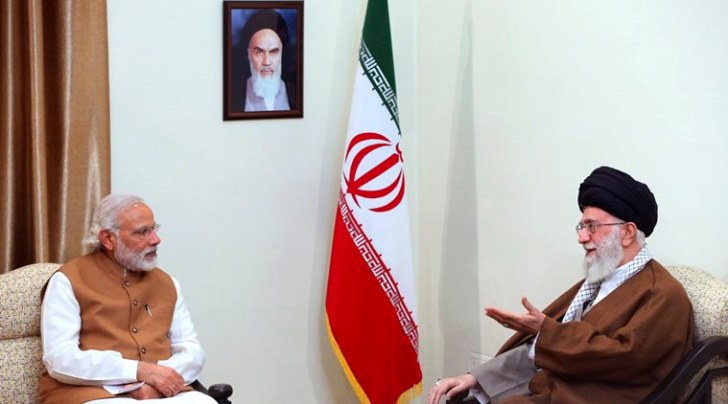

Modi's Iran visit: key takeaways
Narendra Modi's Iran visit: key takeaways
India and Iran inked a dozen agreements ranging from a contract to develop the strategic Chahabar port to an initial pact to set up an aluminium plant and one on laying a railway line to give India connectivity to Afghanistan and Central Asia.
The agreements and MoUs signed during Prime Minister Narendra Modi's visit to Iran will further deepen the bilateral ties in diverse fields.
Here are the key takeaways:
Chabahar project
India, Afghanistan and Iran signed the trilateral trade treaty for developing the Chabahar port. The strategic location of the port will allow India to access Central Asia through Afghanistan, more importantly skipping Pakistan, and the Persian Gulf as it is the only Iranian port with access to the Indian Ocean.
Modi-Rouhani meet
“We have agreed to consult closely and regularly on combating threats of terrorism, radicalism, drug trafficking and cyber crime,” Mr. Modi said at a joint press conference with Iranian President Hassan Rouhani after the two held one-on-one talks.
Terming the dosti (friendship) between India and Iran as old as history, he said “through centuries, our societies have stayed connected through art and architecture, ideas and traditions, and culture and commerce. Expanded trade ties, deeper connectivity, including railways, partnerships in oil and gas sector, fertilizers, education and cultural sphere are driving our overall economic engagement.”
Talking about a trilateral Transport and Transit Agreement with the participation of Iran, Mr. Modi said, “It will open new routes for India, Iran and Afghanistan to connect among themselves. India and Iran also share a crucial stake in peace, stability and prosperity of the region.”
Culture and technology
An MoU was signed between School for International Relations of the Ministry of Foreign Affairs of Iran and the Foreign Service Institute (FSI) of India.
Also signed was an executive protocol between the Ministry of Science, Research and Technology of Iran, and India’s Ministry of Science and Technology and an MoU between National Archives of India and National Library of Iran.
An executive programme of cultural cooperation between the Ministry of Culture and Iran’s Ministry of Culture and Islamic Guidance as well as an MoU between Iran’s Islamic Culture and Relations Organisation and the Indian Council for Cultural Relations was also signed.
List of MoUs signed:
S.No Title of MoU Description
1 India-Iran Cultural Exchange Programme The objective is to extend the CEP for the period 2016-2019 covering the areas of culture and art; radio, TV, mass media and cinema; and relevant general and financial terms.
2 MoU between the Ministry of External Affairs (MEA) of India and the Ministry of Foreign Affairs (MoFA) of Iran on Policy Dialogue between Governments and Interaction between Think Tanks The MoU seeks to create a Joint Secretary/Director General policy dialogue as well as encouraging new institutional mechanisms between think tanks on both sides. There is also a provision for a conference on contemporary issues of regional and global significance.
3 MoU between Foreign Service Institute, MEA and the School of International Relations, Iran’s MoFA This MoU is intended to enhance cooperation between the two parties for training of diplomats and exchange of eminent speakers.
4 Implementation Protocol between Department of Science and Technology, Ministry of S&T and Iran’s Ministry of Science, Research and Technology on Cooperation in the Fields of Science and Technology The IP fleshes out the specific cooperation between the two sides pursuant to the 2003 MoU and covers areas like exchange of experiences, seminars, conferences etc.
5 MoU between Indian Council for Cultural Relations and Islamic Culture and Relations Organizations of the IR Iran The MoU provides for institutional mechanisms for cooperation between ICCR and ICRO and lays down the modalities for the cooperation.
6 Bilateral contract on Chabahar Port for port development and operations between IPGPL [India Ports Global Private Limited] and Arya Banader of Iran The contract envisages development and operation for 10 years of two terminals and 5 berths with cargo handling [multipurpose and general] capacities.
7 MoU between EXIM Bank and Iran’s Ports and Maritime Organization [PMO] oncurrent specific terms for the Chabahar Port project This MoU is intended for the purpose of credit of USD 150 million for Chabahar port.
8 Confirmation Statement between EXIM Bank and Central Bank of Iran This confirms the availability of credit up to INR 3000 crore for the import of steel rails and implementation of Chabahar port.
9 MoU between ECGC [Export Credit Guarantee Corporation] Limited of India and the Export Guarantee Fund of Iran (EGFI) The MoU seeks to establish a framework of cooperation between ECGC and EGFI in supporting and encouraging foreign trade and foreign investment between India and Iran and, where appropriate, the supply of goods and services from their respective countries as part of a project to a third country.
10 MoU between National Aluminium Company Limited (NALCO) and the Iranian Mines and Mining Industries Development and Renovation Organization (IMIDRO) The objective is for the two parties to jointly explore the possibility of manufacturing aluminium metal by setting up of a smelter on joint venture basis in Iran and/or entering into tolling arrangements with smelters in Iran or any other form of business collaboration including sale of alumina etc.
11 MoU between IRCON and Construction, Development of Transport and Infrastructure Company (CDTIC) of Iran MoU will enable IRCON to provide requisite services for the construction of Chabahar-Zahedan railway line which forms part of transit and transportation corridor in trilateral agreement between India, Iran and Afghanistan. Services to be provided by IRCON include all superstructure work and financing the project (around USD 1.6 billion).
12 MoU for cooperation between the National Archives of India and the National Library and Archives Organisation of the Islamic Republic of Iran The aim to for facilitation of exchange of information and knowledge in the field of archival matters through exchange of manuals, guidelines, rules, publications and other special literature on archival topics.


